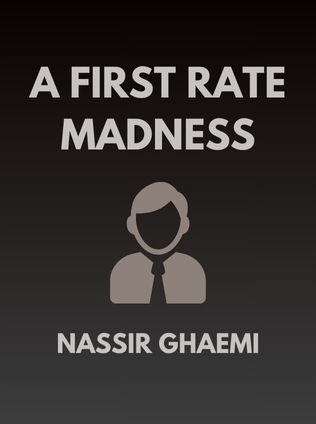
About the Author
Nassir Ghaemi is a psychiatrist and the director of the Mood Disorder Program at Tufts Medical Center. His expertise lies in the study and treatment of mood disorders, particularly depression and bipolar disorder. With a career spanning numerous books and over 100 scientific articles, Ghaemi has established himself as a leading voice in the intersection of mental health and leadership. His unique perspective challenges conventional wisdom, suggesting that mental illness, often seen as a hindrance, can actually be an asset in leadership, particularly during times of crisis.
In A First-Rate Madness, Ghaemi explores the lives of historical leaders, arguing that their experiences with mental illness contributed to their leadership effectiveness. By examining figures like Winston Churchill, Franklin D. Roosevelt, and Martin Luther King Jr., Ghaemi illustrates how conditions such as depression and bipolar disorder can enhance traits essential for leadership in turbulent times.
Main Idea
The central thesis of A First-Rate Madness is that mental illness can be a powerful asset in leadership, particularly during crises. Ghaemi argues that traits associated with mental illness—such as realism, empathy, resilience, and creativity—are precisely what make certain leaders more effective in navigating difficult situations. Contrary to the common belief that good mental health is a prerequisite for good leadership, Ghaemi posits that in times of peace and stability, mentally healthy leaders may excel, but during crises, it is often those with mental health challenges who rise to the occasion.
Ghaemi's work challenges the stigma surrounding mental illness, advocating for a more nuanced understanding of how these conditions can contribute positively to leadership. He asserts that by embracing the complexities of mental health, we can cultivate leaders who are better equipped to handle the challenges of our times.
Table of Contents
- Introduction: Redefining Leadership and Mental Health
- The Mental Health Spectrum: Understanding Normal and Abnormal
- Depression: The Power of Realism and Empathy
- Bipolar Disorder: Resilience and Innovation in Leadership
- Case Studies: Historical Leaders and Mental Illness
- The Pitfalls of Mental Wellness in Leadership
- Treatment and Leadership: The Role of Proper Care
- Conclusion: Embracing Complexity in Leadership
Introduction: Redefining Leadership and Mental Health
In the introduction to A First-Rate Madness, Ghaemi sets the stage for a radical rethinking of leadership and mental health. He argues that our traditional understanding of what makes a good leader is too narrow, often excluding those who have struggled with mental illness. Ghaemi suggests that rather than being disqualified by their mental health challenges, these individuals may actually be better suited to leadership, particularly in times of crisis. He writes,
"Great crisis leaders are not like us; they are mentally abnormal (the technical term is 'mentally ill'). Their weakness is the secret of their strength; their vulnerability is the source of their wisdom." - Nassir Ghaemi
The Mental Health Spectrum: Understanding Normal and Abnormal
Ghaemi introduces the concept of the mental health spectrum, emphasizing that mental health is not a binary state but exists on a continuum. On one end, we have those who are mentally healthy, and on the other, those who are mentally ill. However, there is also a significant middle ground occupied by individuals with abnormal personalities or temperaments that are not fully healthy nor fully ill.
Sign up for FREE and get access to 1,400+ books summaries.
You May Also Like
The Subtle Art of Not Giving a F*ck
A Counterintuitive Approach to Living a Good Life
By Mark MansonHow To Win Friends and Influence People
The All-Time Classic Manual Of People Skills
By Dale CarnegieFreakonomics
A Rogue Economist Explores the Hidden Side of Everything
By Steven D. Levitt and Stephen J. Dubner



















